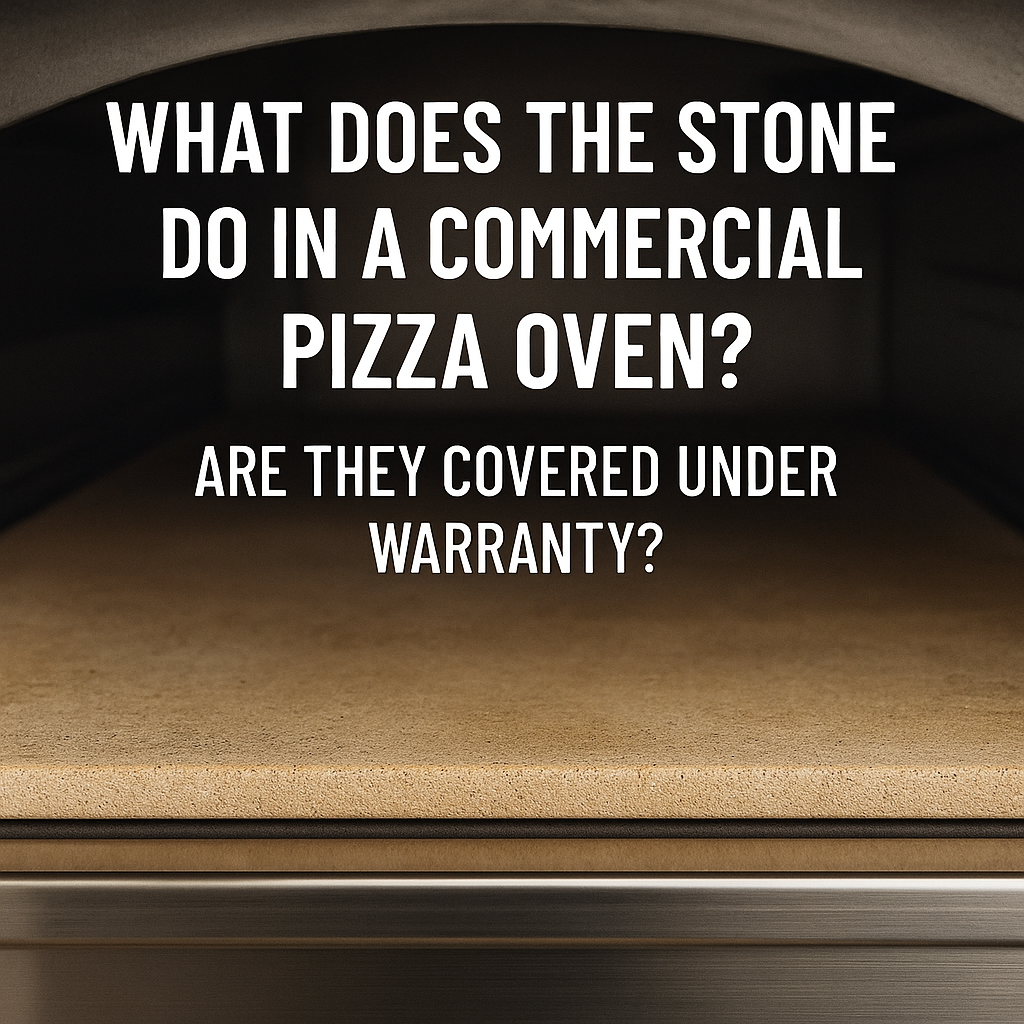When investing in a commercial pizza oven—whether it’s from trusted brands like GAM, Paramount, or Atlas—understanding the role of the pizza stone (also known as a baking deck or stone base) is essential. The stone is one of the most important components in achieving authentic results, and knowing how it works, how to care for it, and what warranty coverage looks like will help you get the most out of your oven.
What Does the Stone Do in a Commercial Pizza Oven?
The stone deck is the heart of a traditional pizza oven. Unlike metal trays or racks, the stone plays a critical role in producing restaurant-quality pizzas.
-
Heat Retention & Distribution
-
Stones are designed to absorb heat evenly and retain it for long periods.
-
When a pizza is placed directly on the stone, it gets immediate, consistent heat transfer from below, ensuring a perfectly crisp base.
-
-
Moisture Absorption
-
Stones absorb excess moisture from the dough.
-
This prevents soggy bases and delivers the sought-after crispy, authentic texture of wood-fired style pizza.
-
-
High-Temperature Cooking
-
Commercial stones can withstand temperatures of 300–500°C, much higher than standard domestic ovens.
-
This allows pizzas to cook quickly—often in just a couple of minutes—without burning.
-
-
Versatility
-
Beyond pizza, stones are used for breads, pastries, flatbreads, and calzones, making them essential in bakeries and restaurants.
-
Common Materials Used for Pizza Stones
Depending on the oven brand, stones are typically made from:
-
Cordierite – Highly durable, resistant to thermal shock, ideal for frequent use.
-
Refractory Brick/Stone – Traditional material that offers excellent heat retention.
-
Ceramic Stones – Found in some commercial ovens, though more prone to cracking under heavy use.
GAM, Paramount, and Atlas ovens generally use refractory stone decks, chosen for their ability to withstand the demands of busy commercial kitchens.
Are Pizza Stones Covered Under Warranty?
This is one of the most common questions buyers ask. The short answer: usually not.
-
Pizza stones are considered consumable parts (like light bulbs, seals, or gaskets).
-
Warranty policies typically exclude them because cracking or wear occurs naturally over time, especially under heavy commercial use.
-
However, damage caused by a manufacturing defect (for example, a stone arriving already cracked or splitting prematurely under normal use) may be covered within the initial warranty period.
Key Warranty Notes:
-
GAM, Paramount, and Atlas ovens often specify in their manuals that stones are excluded from standard warranties.
-
Replacement stones are readily available, but care and proper handling can greatly extend their life.
How to Care for Your Pizza Stone
Since stones are usually not covered under warranty, proper care is critical.
-
Preheat Gradually
-
Avoid exposing the stone to sudden, extreme changes in temperature. This helps prevent cracking.
-
-
Do Not Use Water for Cleaning
-
Stones are porous and will absorb water, leading to potential damage. Instead, scrape off food debris with a brush or scraper.
-
-
Avoid Oils and Fats
-
Excess oil can seep into the stone and cause smoking or unwanted flavors.
-
-
Rotate if Possible
-
Some ovens allow rotation of the stone to balance wear and heat exposure.
-
-
Handle with Care
-
Stones are heavy but fragile. Avoid dropping or hitting them against hard surfaces.
-
Why Choosing the Right Oven Matters
Brands like GAM, Paramount, and Atlas have built reputations for producing reliable commercial pizza ovens with durable stone bases. While the stones are consumable parts, the overall build quality of these ovens ensures that replacements are easy to source and installation is straightforward.
Investing in a high-quality oven with a properly maintained stone guarantees:
-
Authentic pizza results
-
Faster cooking times
-
Long-term performance in demanding kitchens
Final Thoughts
The pizza stone is the backbone of any commercial pizza oven. It ensures consistent cooking, crisp bases, and authentic flavor that metal trays simply can’t replicate. While stones are typically not covered under standard warranties, careful use and maintenance will keep them performing at their best for years.
Whether you’re considering a GAM oven for its Italian craftsmanship, a Paramount oven for versatility, or an Atlas oven for robust performance, understanding the role of the stone will help you get the most out of your investment.










